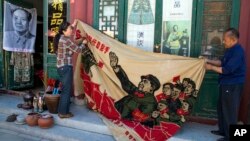The main newspaper of the Chinese Communist Party has offered rare commentary about the 50th anniversary of the Cultural Revolution, stating the harm the decade-long upheaval caused was "comprehensive and severe."
The seemingly momentous anniversary was all but ignored and met with virtual silence from China’s state-run media until an opinion piece was published one day after the anniversary on the People's Daily website. The commentary was also published later in the paper's print edition.
The commentary said, in part, "History has amply demonstrated that the Cultural Revolution was totally wrong in theory and practice. In no sense was it, or could it have been, revolutionary or socially progressive."
The article represents the party's highest-level remarks about the Cultural Revolution, a campaign led by Mao Zedong, the founding father of the People's Republic of China, to purportedly create a more just society, but in practice led to social upheaval and economic disaster.
The commentary urged readers to lay to rest any further debate of the Cultural Revolution and to move forward under the leadership of President Xi Jinping.
The Global Times newspaper, which is under the control of the People's Daily, also broke its silence, emphasizing in a commentary the Cultural Revolution is an historical event. "We've said bye-bye to the Cultural Revolution a long time ago. Today, we can say one more time that the Cultural Revolution cannot and will not stage a comeback."
What happened 50 years ago?
On May 16, 1966, Chinese Communist Party Chairman Mao launched the campaign by purging several top party officials and announcing his agenda that ostensibly sought to return power to the working class that had been usurped by the bourgeois.
What followed wasn’t the communist utopia Mao had planned, but also a brutal period of violence, food shortages and economic hardship that led to the persecution and death of millions of people.
China's communist party had long suppressed open dialog about the tumultuous period, fearing it could undermine the party's legitimacy to rule and prompt criticism of Mao, who remains a revered figure in China.
Nostalgia for Mao's ideas
Despite the disastrous economic and social effects of his policies, Mao’s ideas have seen a resurgence in recent years, particularly among the old and poor members of society who hold a certain nostalgia for the time when the state provided for them and society was more equal, glossing over the death and destruction.
"Either it's because people have forgotten the Cultural Revolution or are increasingly dissatisfied with social conditions, but since the mid-1990s these kinds of ideas have been gaining currency," Xu Youyu, a former Chinese Academy of Social Sciences researcher, told The Associated Press.





